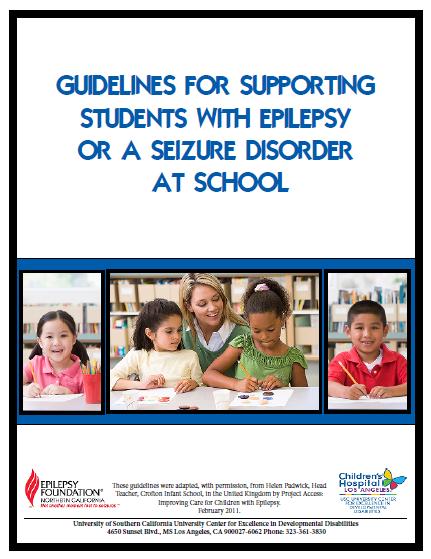CA UCEDD Develops Resource for Educators: Guidelines for Supporting Students with Epilepsy or a Seizure Disorder at School
May 25, 2011

|
Over the past six years the USC UCEDD has worked in partnership with Epilepsy Foundation of Northern California to improve access to care for children and youth with epilepsy and their families residing in rural and frontier communities in Alaska (AK), California (CA), Nevada (NV), and Wyoming (WY). Project Access developed a variety of tools and resources aimed at providing educators and caregivers with information needed to build a safe and optimal learning environment for their students with epilepsy. The resources are available in multiple languages and have been developed to provide information on how to address services and coordinate care for a child/student with epilepsy.
"Epilepsy and Seizure Disorders: A Resource Guide for Parents"( http://uscucedd.org/downloads/products_publications/parent_resources/epilepsy/Epilepsy%20Parent%20Guide.pdf) is a guide for parents, caregivers, and professionals (including educators) serving families of children with epilepsy and/or seizure disorder that includes basic information about epilepsy. The guide also includes information about resources to help families access health services, advocate and support their child with epilepsy and organize health information using the forms and tools.
"Guidelines for Supporting Students with Epilepsy or a Seizure Disorder at School" (http://uscucedd.org/downloads/products_publications/parent_resources/epilepsy/Managing_Epilepsy_Schools.pdf) is new supplemental guide for school administrators and educators on how to create an optimal environment for students with epilepsy/seizure disorders. The guide contains tips and advice on how to manage the child's special needs should a seizure occur while at school. In addition the "Seizure Action Plan" (http://www.epilepsynorcal.org/docs/Seizure-Action-Plan_v1.pdf) is available to detail a child's unique medical needs and care plan during an emergency. This tool is to be completed by the parent/guardian and physician of the child with epilepsy and should be kept with the school nurses or principal. These products can help school administrators and educators to provide individualized care for children with epilepsy.
All resources can be printed or accessed for free at http://www.epilepsynorcal.org > Resources> Project Access. For more information on these products or for additional information about Project Access, please contact Cary Kreutzer, MPH, RD at [email protected].







